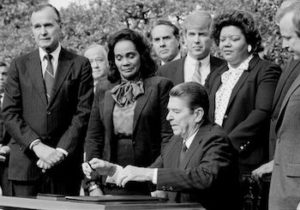
*On this date in 1983, the legislative bill establishing Martin Luther King Day as a national holiday was signed.
The official holiday, on the third Monday of January, began in 1986. It was the first new American holiday since 1948, when Memorial Day was created as a "prayer for peace" day. Also, it was only the second national holiday in the twentieth century (the other was Veterans Day, created as Armistice Day in 1926 to honor those who died in World War I).
King was not the only American besides George Washington who had a national holiday designated for his birthday (those of Abraham Lincoln, Thomas Jefferson, Robert E. Lee, and others are celebrated in some states but not nationwide). George Washington Carver Day was signed in 1945 by President Truman.
Internationally, King was one of the few social leaders of any country to be honored with a holiday (Mahatma Gandhi's birthday is observed in India). Such standing by a country's racial minority member is almost unheard of. Usually, the honor is reserved for military or religious figures. When President Ronald Reagan signed legislation creating the holiday, it marked the end of a persistent, highly organized lobbying effort across the nation that lasted 15 years. "We worked hard to put together a national effort and make a powerful network," said Cedric Hendricks, legislative aide to Rep. John Conyers, Michigan Democrat.
Conyers submitted the first legislation to commemorate his birthday four days after King was assassinated in Memphis. Petitions with more than 6 million signatures, the largest petition drive in history, were submitted to Congress in 1970. With help from New York Democratic Rep. Shirley Chisholm, Conyers resubmitted the legislation during each congressional session. The Southern Christian Leadership Conference, which coordinated the petition campaign, pressured Congress continuously for the holiday. Mass marches in 1982 for voting rights and 1983 to mark the 20th anniversary of King's speech in Washington, D. C., also were a factor.
It took bipartisan support to overcome the opposition of Sen. Jesse Helms, R-North Carolina, who called King a Communist, and President Reagan's lukewarm feelings toward the legislation. In the final analysis, a compromise offered by Rep. Katie Hall, an Indiana Democrat who marshaled support in the House for the legislation, may have sealed approval of the holiday.
Hall, responding to criticism that the holiday would be too close to the Christmas/New Year's week, moved its observance to the third Monday of the month. The notion of a three-day weekend, plus the fact that the third Monday (at the time) followed Super Bowl Sunday, helped push the measure through.
Library of Congress
101 Independence Avenue S.E.
Washington D.C. 20540